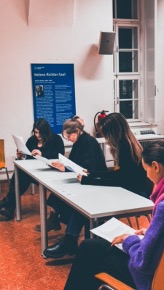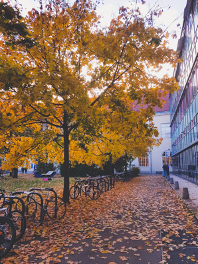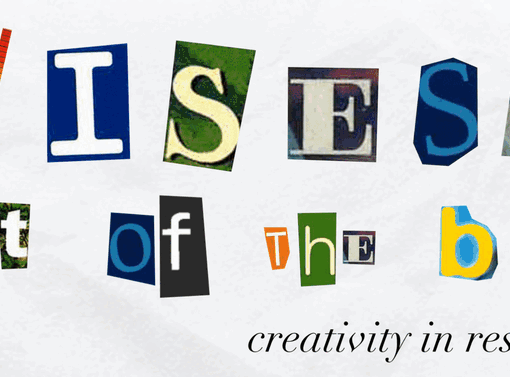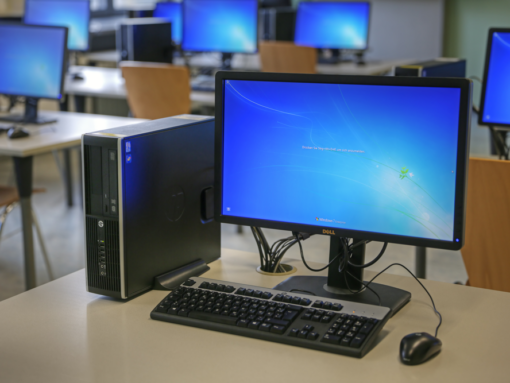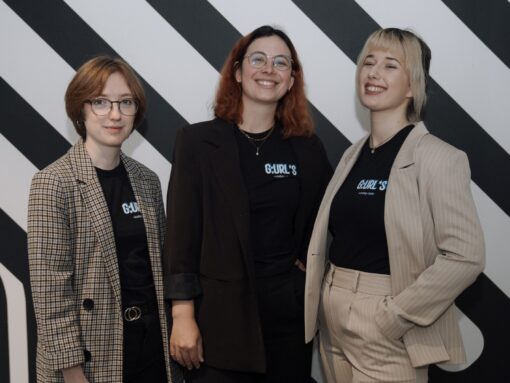Can AI do it all? Certainly not everything – creativity still comes from the human mind. Students of the department of English and American Studies at the University of Vienna talk about their experiences with creative writing. In their course, they turn their creative ideas into fiction. Blog post by Zolzaya Altan, Giovanna Dobinger, Julia Leidig and Manuel Meschiari.
“
Why bother, then? Just use Artificial Intelligence and be done with it. An AI tool is already capable of writing structured academic texts, among others. Therefore, creative work should be a piece of cake, too, right?
But that is the thing with creative writing. It is not easy. But not impossible.
Even when the mission’s main objective is to take the University of Vienna’s semester question “Can health be fair for all?” as a starting point for inspiration, and create plays that will tackle the theme of accessible healthcare and the complexities that people face to be able to afford it.
At the end of the semester, students will present their plays, tackling the semester question they work on in groups. It will be in fair Vienna, where we lay our scene.
Why creative writing matters
Creative writing is a form of art that goes beyond the traditional writing associated with academics. Creative writing allows you to express emotion, develop characters, and put your imagination into words. Stories that fill your head can come to life by being written down.
And that is what the Creative Writing course at the English and American Studies department here at the University of Vienna does. Students get the chance to nurture their love and gift for writing.
We start the course with flash fiction, a piece of narrative compressed into a limited word count. Then, we move on to building our very own fantasy cities, where everything, from the inhabitants to the flora and fauna, is entirely up to us. At the end of the semester, students will present their plays, tackling the semester question they work on in groups. It will be in fair Vienna, where we lay our scene.
In an age where AI is increasingly employed for creative tasks, from music production to paintings, from novels to TV scriptwriting, the importance of our creative writing class becomes clearer and clearer to us with every passing day.
Did AI kill the creativity star?
In an age where AI is increasingly employed for creative tasks, from music production to paintings, from novels to TV scriptwriting, the importance of our creative writing class becomes clearer and clearer to us with every passing day. At this point, it may look like creativity is staring down the barrel of a gun, where a machine will eventually replace humans, leading to the death of human creativity. However, can AI really become creative and replace humans?
As mentioned before, in our class we explore the depths of human imagination: we write flash fiction, build fantasy cities, and compose a weekly imagination journal. Our final creative assignment is crafting an original 10-minute play, diving into the exciting world of dramatic storytelling, dialogue, and character development. While writing these plays is undoubtedly challenging, it is a rewarding exercise that sharpens our creativity and pushes our boundaries. Of course, AI can be a useful tool in this creative process: it can offer inspiration, structure, or assistance. However, it cannot ever replace the uniquely human ability to infuse stories with emotion, different and personal perspectives, and…well, a soul. This is why nurturing human creativity remains vital in a world embracing automation. As we tackle a complex question like ‘Can healthcare be fair for all?’, we want to highlight the uniquely human capacity to grapple with ethical dilemmas, empathy, and social justice. Qualities no machine can truly replicate.
Tools to make the Mission Possible
Characters
As we said before, writing is not as easy as it may seem to some. This creative writing course gave us certain tools and led us on a journey of turning our creative ideas into imaginative storytelling. Our first stop in this creative writing journey was character-building. When you think about your favorite character in any piece of media of your choosing, what is something ordinary about them, and what makes them special? To make characters come alive means that they have to be believable and most importantly, complex. A boring character will not keep a reader’s attention, so, how do we keep the reader engaged with the story and the characters? Conflict.
Conflict
Our second stop on this trip showed us that there are so many ways in which conflict and tension can be built; from characters having disagreements or fights with other characters, to the characters struggling internally with self-doubt or mental health issues. We can up the scale to characters fighting against supernatural beings such as dragons in Fantasy stories or characters participating in an intergalactic war in a Science Fiction story. Finally, almost at the end of our journey, our characters and conflicts needed a set, a stage. Will our characters be strolling through peaceful meadows where sheep are grazing or are they fighting for their life to escape a cold prison cell at the very bottom of a dungeon? We will find out where our playwrights chose to set the stage, who will become the protagonist, and what conflict they are going to try to solve when our journey comes to an end with the final performance of their plays.
The Plays
We also wanted to share with you a closer look into the creative processes of our playwrights, so we asked them a few questions. Here is what we found out:
Teamwork and co-writing
Creative writing can be a wild ride as it is: sleepless nights, staring at a blank page, countless edits, re-edits, and copious cups of tea or coffee. Now imagine going through this with three other people. Four people staring at a blank page, forced to not only edit their ideas and words but also the creative output of others.
In small writing groups, our classmates have set out on a journey of creating their 10-minute plays, and they aim to craft a story that not only sees them passing the course but hopefully engages viewers in stimulating and thought-provoking ways. With the semester question as an overarching theme, they plan to raise awareness about the inequalities and injustices in medicine and how they can affect interpersonal relationships.
“Starting at the roots of the story, it evolves and grows as each new idea is added, branch by branch until it becomes a strong and meaningful tree.”
Finding common ground
When writing a story, the first obstacle presents itself right as you sit down to do it: where to begin? Finding a starting point is even more difficult if you are working with a group of people. Where’s our story going to take place? What if one person proposes a hospital, but somebody else has their heart set on the depths of the Brazilian jungle? What is our stage going to look like? Like a modern, minimal theatre stage? Or are we simply going to imagine our classroom? Which different kinds of characters will appear in our play? How are we going to involve them in meaningful and riveting conflicts? Imagine three out of four people spinning the most touching and passionate love stories, while the fourth person is revolted by romantic plots. Thus, there are positive and negative aspects to creative collaboration.
Diverse perspectives
One of our classmates aptly described the perks like this: “Working in a team bolsters ideas. It provides instant diverse perspectives and contributions, which one may not be privy to if one worked alone.” Different creative minds bring unique ideas, experiences, and inspirations to the table, which can be interesting and stimulating. One team member used the metaphor of a tree for this: starting at the roots of the story, it evolves and grows as each new idea is added, branch by branch until it becomes a strong and meaningful tree.
However, it can also be extremely challenging to create a cohesive narrative that includes everybody’s preferences, ideas, and words. Uniting different creative voices is quite a task. Not to mention the practical dimensions that may impede the collaborative process, like time management, the distribution of work, and balancing the general workload.
The Table Read
A table read is the read-through of the script, involving writers, directors, and actors. The script is read out loud by the actors to gather a feeling for what works well and what doesn’t. This way writers, directors, and producers can get immediate feedback and make the appropriate changes before performing a play or shooting a film/show.
If you are as curious as we are about what our playwrights have created against all odds, merging their different backgrounds, storylines, and ideas, come and join us for our final table read, in fair Vienna, where we lay our scene.
In fair Vienna, where we lay our scene
Hereby, we would like to extend our invitation to the table read of the plays.
Date: 21 and 28 January 2025
Time: 16:15 – 17:45
Location: Helene Richter Saal at the department of English and American Studies
Insider info: Free Prosecco + Popcorn
Photo credits: (c) Zolzaya Altan, Giovanna Dobinger, Julia Leidig & Manuel Meschiari


